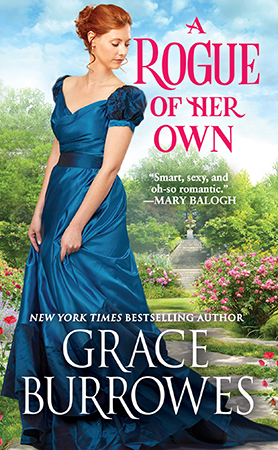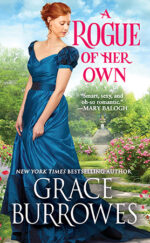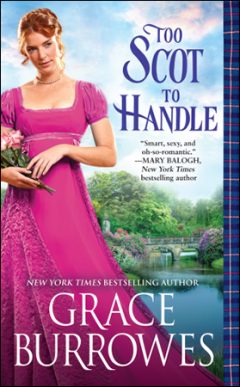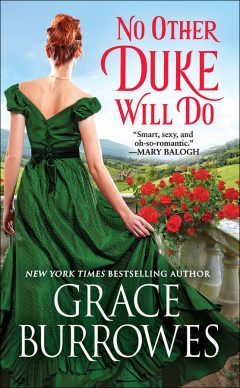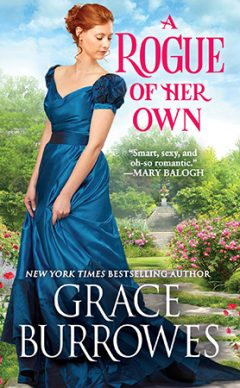A Rogue of Her Own
Book 4 in the Windham Brides series
For Miss Charlotte Windham, the best way to maintain her spinsterhood—and her independence—is a teeny, tiny brush with scandal. She chooses wealthy, handsome upstart Lucas Sherbourne as her unwitting accomplice. He’s intelligent, logical and ambitious. What Charlotte doesn’t count on is that one kiss leads straight to the altar.
Sherbourne has no love for Polite Society, nor is he keen on being anybody’s husband of last resort. He is attracted to Charlotte’s boldness, though—and her family’s influence. Without a title, he knows he’ll never truly be part of their world, even as he and Charlotte inch closer to a marriage that means much more than convenience. But a scheming business partner is about to test that tenuous trust, forcing Sherbourne to make a drastic choice: his wealth or his wife.
Enjoy An Excerpt







Chapter One
“Heed me, Miss Charlotte, for mine is the only offer you’re likely to receive, no matter that your uncle is a duke. I am a viscount, and you shall like being my viscountess very well.”
Charlotte Windham had no choice but to heed Viscount Neederby, for he’d taken her by the arm and was nearly dragging her along Lady Belchamp’s wilderness walk.
“My lord, while I am ever receptive to knowledgeable guidance, this is neither the time nor the place to make a declaration.” Never and nowhere suited Charlotte when it came to proposals from such as Neederby.
He marched onward, simultaneously walking and pontificating being one of his few accomplishments.
“I must beg to differ, my dear, for receptive to guidance you most assuredly are not. Married to me, your sadly headstrong propensities will be laid to rest. My duty and pleasure as your devoted spouse will be to instruct you in all matters.”
His lordship sent her a look, one intended to convey tender indulgence or a disturbance of the bowels, Charlotte wasn’t sure which.
“Might we circle back to the buffet, sir? All this hiking about has given me an appetite.” Neederby finally halted, though he chose a spot overlooking the Thames River. What imbecile had decided that scenic views were a mandatory improvement on Nature as the Almighty had designed her?
“Were you being arch, Miss Charlotte? I believe you were. I have appetites too, dontcha know.”
Neederby fancied himself a Corinthian, as accomplished at all the manly sports as he was at tying a fancy knot in his cravat. Hostesses added him to guest lists because he had a title and had yet to lose either his hair or his teeth in any quantity.
In Charlotte’s estimation, his brains had gone missing entirely. “I haven’t an arch bone in my body, my lord. I am, however, hungry.” The occasion was a Venetian breakfast, and Charlotte had intended to do justice to the lavish buffet. The roaring water more than ten yards below the iron railing had carried away her appetite.
“One hears things,” Neederby said, wiggling his eyebrows. “About certain people.” Charlotte heard the river thundering past and edged back from the overlook. “I have no interest in gossip, but a plate of Lady Belchamp’s buffet offerings does appeal.”
His lordship clamped a gloved hand over Charlotte’s fingers. “What about my offerings? I’m tireless in the saddle, as they say, and you’re in want of a fellow to show you the bridle path, as it were.” Equestrian analogies never led anywhere decent.
Charlotte escaped Neederby’s grasp by twisting her arm, a move her cousins had shown her more than ten years ago.
“I’m famished, your lordship. We can return to the buffet, or I’ll leave you here to admire the view.” Neither option could salvage Charlotte’s morning. The gossips would claim that she had taken too long on this ramble with his lordship, or that she’d returned to the party without his escort, both choices unacceptable for a lady.
As the only remaining unmarried Windham, Charlotte had earned the enmity of every wallflower, failed debutante, matchmaker, and fortune hunter in Mayfair. The little season brought the wilted and the wounded out in quantity, while Charlotte—who considered herself neither—longed to retire to the country.
Neederby moved more quickly than he reasoned, and thus Charlotte found herself trapped between him and the railing.
“When anybody’s looking,” he said, “you’re all haughty airs and tidy bonnet ribbons, but I know what you fast girls really want. Married to me, you’d be more than content.”
Married to him, Charlotte would be a candidate for Bedlam. “I need breakfast, you buffoon, and I haven’t been a girl for years. Get away from me.”
Charlotte also needed room to drive her knee into his jewelbox, and she needed to breathe. His lordship took a step closer, and Charlotte backed up until the railing was all that prevented her from falling into the torrent below. Her vision dimmed at the edges and the roaring in her ears merged with the noise of the river.
Not now. Please, not here, not now. Not with the biggest nincompoop in all of nincompoopdom flinging his marital ambitions at me.
The thought had barely formed when Neederby was abruptly dragged three feet to the right.
“Sherbourne,” his lordship squawked. “Devilish bad taste to interrupt a man when he’s paying his addresses.”
Lucas Sherbourne was tall, blond, solidly built, and at that moment, a pathetically welcome sight.
“If that’s your idea of how a gentleman pays his addresses,” Sherbourne said, “then I’d like to introduce you to my version of target practice at dawn.”
“His lordship was not paying his addresses,” Charlotte bit out. She clung to the rail in hopes of remaining upright, and yet, she needed to get away from the precipice.
Sherbourne peeled her fingers free one by one and offered his arm. “Then I misread the situation, and his lordship merely owes you an apology.” Sherbourne glanced at the river, then at Neederby, as if measuring angles and distances.
Charlotte’s heart was beating too fast and her knees were weak, else she might have managed a dignified exit. Instead, she held fast to Sherbourne’s muscular arm—needs must—and conjured a mental image of her grandmother Holsopple’s fancy tea service.
“My apologies,” Neederby muttered, yanking on his waistcoat. “I’ll wish you good day, Miss Charlotte.”
He turned his back on Sherbourne—a lord’s privilege where a commoner was concerned, but rude treatment of a lady—and stalked off in the direction of the next scenic view.
Sherbourne switched positions, so he stood between Charlotte and the railing. “If you were any more pale, I’d be measuring you for a winding sheet. Come sit.”
On some other day or in some other place that offered no dratted scenic vista, Charlotte would chide him for his peremptory tone.
“Your store of flattery is wanting, Mr. Sherbourne.” She could not possibly sit on the bench he’d led her to. “The prospect does not appeal.”
“The prospect of being seen in my company? Perhaps you’d prefer the pawing and snorting of Lord Nettlebum, or one of his equally blue-blooded—”
Charlotte waved a hand. “The prospect of the river. So far below.”
Sherbourne glanced past her shoulder. “A long leap, I’ll grant you, but hardly…Are you about to faint on me, Charlotte Windham?”
The curiosity in his tone—no outrage or dismay—had Charlotte standing straighter. “And fuel the talk already circulating? What do you take me for?”
Sherbourne was a social upstart, but he was a wealthy, single upstart who had the good fortune to be neighbors with the Duke of Haverford in Wales. That fine gentleman had recently married Charlotte’s sister Elizabeth, and thus Sherbourne was a well-connected, wealthy, single upstart.
Also a pest, but not a fool.
Charlotte watched him adding facts and observations, and coming to the logical conclusion.
“Have you taken any sustenance?” he asked. “The buffet line was long earlier. Perhaps a spot of tea would appeal?”
“A spot of tea would be heavenly. Thank you.”
That Sherbourne would be both kind and discreet was miraculous. Later, Charlotte might find the resolve to resent him for both—why had he been the one to interrupt Neederby, why not some meddling cousin or devoted auntie?—but for now, she was grateful simply to leave the river’s edge.
***
“Writing to one of your sisters again?” Julian St. David, Duke of Haverford, asked his duchess.
Elizabeth had taken over the tower room known as the Dovecote for her personal corner of Haverford Castle. She set aside the page she’d been working on and rose to hug him.
“I’ve missed you, Haverford.”
He’d been gone less than three hours. “I’ve missed you, too. I promised Sherbourne I’d keep an eye on his acres, and that requires the occasional glance in the direction of his property. His steward isn’t exactly an advertisement for modern agricultural practices.”
Elizabeth remained in Julian’s arms, and that was fine with him, for he loved to hold her. They’d met when she’d attended his summer house party. From the first day, Elizabeth had begun setting Haverford Castle and its owner to rights.
Now that she was the chatelaine, the property boasted a lot fewer musty old books, also a lot less dust and mildew. Windows had become spotless, carpets once again had luster, and not a single chimney dared smoke.
Being a duke had never been such a comfy, pleasant undertaking, while being Elizabeth’s husband…
“I’m in need of a nap,” Julian said. “Cantering all over the shire tires a fellow out.”
“You need luncheon first. Napping with your duchess requires stamina.”
“Point to the lady.”
A tap sounded on the door, and Julian admitted a footman bearing a tray. As usual, Elizabeth had anticipated her spouse’s appetites, not merely his desires.
She settled beside him on the sofa and let him fix the tea. Then she let him feed her a piece of shortbread, then she let him kiss her until he was more or less lying atop her, the tea growing cold.
“We have a perfectly lovely bed,” Julian said. “Why am I compelled to accost you on sofas, benches, picnic blankets?”
“I made the overtures on the picnic blanket,” Elizabeth said, stroking a fingertip over his eyebrow. “I’ve grown fond of picnic blankets.”
Julian was fond of her, and he hadn’t expected that, not so soon, not so…profoundly. He loved Elizabeth, he respected her, and God knew he desired her, but the pure, friendly sense of liking they shared was as precious as their passionate sentiments. She had become his confidante, his sounding board, his advisor, and most of all, his friend.
And his lover, of course. “We’ll picnic after we nap,” he said, giving his wife room to breathe.
“We’ll nap after we’ve done justice to the tray,” Elizabeth said, using Julian’s shoulder to pull herself upright. “I’m worried about Charlotte.”
Hence, the whirlwind of letters flying among the three married Windham sisters. Various cousins participated in the epistolary storm, for the ducal branch of the Windham family had no less than eight healthy offshoots, all happily married.
And all, doubtless, also worried about Charlotte.
“Is this a different sort of worry than you had for her before we married?” Julian asked around a mouthful of shortbread.
“My anxiety is worse, because I am married. We’re all married, except for Charlotte. That can’t be easy. Did you just put butter on your shortbread?”
“I must fortify myself for this lengthy nap you’re planning.”
“Fortify me with both butter and jam,” Elizabeth said. “Will you be wroth with me if I’ve done a bit a matchmaking?”
He would never be wroth with her. “You can make a match for Charlotte by correspondence?”
“I’m a Windham. Matchmaking is my birthright, according to Uncle Percival and Aunt Esther.”
These relations of Elizabeth’s, the Duke and Duchess of Moreland, were a deceptively charming older couple who’d likely brought about half the unions in Mayfair.
“You’re a St. David now,” Julian said, passing her a slice of shortbread slathered with butter and jam. “Thus, I am your accomplice in all things. At whom have you aimed Cupid’s arrow?”
“I didn’t aim it, exactly. Charlotte is so very contrary that I instead warned my aunt that of all men, Lucas Sherbourne ought not to be shoved at Charlotte. She seemed to notice him at the house party this summer, which for Charlotte, is tantamount to a mad passion.”
“You have a bit a raspberry jam on your lip.” Julian kissed the relevant feature. “Scrumptious.”
“If Sherbourne is steered away from Charlotte,” Elizabeth went on, “then she might favor him with the occasional glance.”
“My thoughts complement your own, for I’ve written to Sherbourne that he is not, under any circumstances, to contemplate a courtship of Charlotte Windham. Hold still.”
Elizabeth gave him an amused look—she’d hold still only if she jolly well pleased to, of course—and set down her teacup.
Julian dipped his finger in the jam pot and drew a line of preserves along her décolletage. “Is this one of your favorite frocks?”
“Is the door locked?”
“Yes.” Out of recently acquired habit.
“This is my least favorite dress in all the world.”
Julian stood and shrugged out of his jacket, then undid his cravat and sleeve buttons. “We must earn our rest.”
“We’ll need to hire another seamstress at the rate I go through dresses.”
Julian ran his tongue over the jam adorning Elizabeth’s right breast. “I’m ever mindful of the necessity to economize. We could simply dispense with clothing when we’re at home, and save both time and money.”
Elizabeth swiped her finger through the jam on her left breast, then pressed raspberry sweetness to Julian’s mouth. “I vote we dispense with your clothing right now, Your Grace.”
Julian seconded that worthy motion and had coaxed Elizabeth out of her shoes and stockings when it occurred to him that he was not especially worried about Charlotte Windham. Charlotte had scolded the Duke of Wellington for hiding in the card room at her aunt’s ball, and His Grace had meekly spent the rest of the evening standing up with wallflowers.
Julian was, despite all common sense to the contrary, concerned for Lucas Sherbourne. Sherbourne was a commoner, overly confident, and out of his depth socially among London’s elites. He was also dunderheaded enough to do something truly unforgivable, like propose to Charlotte without even attempting to court her.
***
The look in Charlotte Windham’s eyes had inspired Lucas Sherbourne to interrupt Lord Neederby’s forlorn hope of a proposal.
Sherbourne had had the privilege of studying the lady over the course of a three-week house party earlier in the year, and he’d seen her amused, anxious, disdainful—Charlotte Windham did an exquisitely convincing disdainful—exasperated, mischievous (his favorite, though rare), and in many other moods.
She’d never once looked frightened, but cornered by Lord Nitwit’s matrimonial presumptions, she’d been approaching panic.
“You will please endure my company for the length of the buffet and at least thirty minutes thereafter,” Sherbourne said as he escorted Miss Windham to the Belchamp gardens.
“You will please, for the sake of your unborn children, refrain from giving me orders, Mr. Sherbourne.”
Splendid. Miss Windham was feeling a bit more the thing.
“Heaven forefend that I do more than offer you a suggestion, madam. I’m merely asking for the return of a favor. I spared you the effort of tossing his lordship into the river. You will spare me Lady Belchamp’s devotion. She’s been eyeing me as if I were her favorite dessert.”
Miss Windham smiled, her merriment mostly in her eyes. “Her ladyship gambles imprudently, and thus wealthy, generous bachelors are her favorite sweet.”
Most redheads were striking enough with green eyes, but Charlotte Windham’s eyes were blue. They were the first feature of hers Sherbourne had noticed, and while her eyes were everything a lady’s should be—pretty, slightly tilted, framed by perfectly arched brows—they were also many other things a proper lady’s eyes should not be.
Bold, direct, intelligent, and—this intrigued Sherbourne—subtly unhappy. Why would a woman who claimed a close connection to not one but three dukes have cause for complaint about anything?
“You would toss me to her ladyship’s tender wiles and enjoy my discomfort,” Sherbourne said. “Though I suspect you’d rescue me before my cause was hopeless.”
“Or I’d rescue her ladyship. You are not the tame gentleman you impersonate.”
“Thank you. One fears that a charade perpetrated too earnestly will become reality.” With Charlotte Windham, Sherbourne could only be honest. She’d verbally skewer him for wasting her time with flattery or flirtation.
“Or one fears that such a charade will drive one mad,” Miss Windham muttered.
Well yes, though Sherbourne hadn’t considered that a creeping sense of unease would also plague Miss Windham, who had more titles on her family tree than Wellington had battle honors.
For Sherbourne, this year’s little season had acquired the unwelcome rigor of an expensive finishing school. The Duke of Haverford had decided to turn up cordial after years of polite disdain, and thus Sherbourne had arrived to London with something of a sponsor.
Haverford had sent word ahead to his auntie-in-law, the Duchess of Moreland, that Sherbourne was to be taken in hand, and Sherbourne hadn’t had a decent night’s sleep since arriving to town. Haverford would be made to pay for that kindness, assuming Sherbourne survived the next three weeks.
“If you don’t enjoy all the socializing, waltzing, and gossiping,” Sherbourne said, “why not remove to Kent, or wherever the family seat is, and spare yourself the aggravation?”
“My time is not my own, Mr. Sherbourne. I’m the sole remaining marital project in my family, and the Windhams are a large family.”
“Visit your sister Elizabeth. Wales is lovely in the autumn, and bachelors who are up to your weight are virtually nonexistent there.” With the exception of himself, of course.
Miss Windham gave a slight shake of her head as they approached the buffet. “Try again, sir.”
Ah—he’d spoken in the imperative. “Have you considered a visit to Haverford Castle? I’m sure the duchess would love to have your company.”
“Better, but still a preposterous suggestion. Their Graces of Haverford are newly wed, and a newly wed Windham is a happily preoccupied creature.”
Pre-occupied? If His Grace of Haverford’s besottedness was any indication, both halves of the couple were seldom fully clothed.
Sherbourne was about to direct Miss Windham to try to the apple tarts, but caught himself. “Would you care for some apple tart?”
Had he not seen Miss Windham’s smile for himself, he would never have believed the benevolence of her expression. Her smile suggested that at some point, Charlotte Windham had been a very sweet girl. That sweet girl would have been spared Lord Neederby’s oafish overtures, because even a clodpate such as he would have kept a worshipful distance.
“What do you fancy besides the apple tart?” Miss Windham asked, passing Sherbourne a second plate. “Peckish men are seldom good company.”
They moved down the table, with Miss Windham filling the plates Sherbourne held. The breeze was achingly soft, as early autumn breezes in southern England could be, and the guests had settled about the terraces and walkways in couples and small groups.
Miss Windham had chosen basic fare: slices of beef, small squares of cheese, buttered bread, and half an apple tart. Not for her, the rich desserts or pretty confections, while Sherbourne loved fancy treats.
“You’re not eating much,” he said.
“My digestion is still a bit tentative.” The lady surveyed the lawn as if deciding where to position her cannon. “Let’s enjoy the sun.”
How did a woman enjoy the sun, when she was expected to wear a bonnet and carry a parasol, in addition to covering every inch of skin save her hands—the occasion was a meal out of doors—and her face?
“Excellent choice,” Sherbourne said. “If we sit in the sun, we’ll also avoid the company of females overly concerned about the perils of freckles.”
The sweet smile made a fleeting return. “You’re welcome, though I’ll thank you to defend me from any fortune hunters between bites of apple tart.”
They settled on a bench and were soon consuming their meal.
“Was it Neederby’s addresses that upset your digestion or the height of the overlook?” Sherbourne asked.
“You heard him. I shudder to speculate why he’d think his horseman’s talk could put a lady in a frame of mind for amorous advances.”
For Sherbourne, the connection was easily grasped. “Care for some of my raspberries?”
She frowned at her food. “I thought the raspberries were to go on my plate.”
Sherbourne held out his plate to her. “My mistake, I’m sure. Profound apologies.”
He was nearly flirting, trying to make her smile again, and that was…that was nothing to be concerned about. What else did one do at such an inane gathering?
Miss Windham spooned most of the raspberries onto her plate. “Mistake corrected. At least Neederby didn’t liken marriage to gardening. Poor Lord Helmsford considers himself a botanist, and by the time he’d discoursed about bees, fruits, and pollen, I wasn’t sure if his objective was turning a profit from his orangery or securing the succession. These raspberries are luscious.”
“Helmsford proposed to you?” Helmsford was an ass, even for an earl.
Miss Windham licked the tip of her thumb. “He proposed the first time five years ago, then again last week.”
Helmsford could go to the devil, for all Sherbourne cared, but that small gesture—Charlotte Windham licking a dab of raspberry from her thumb—lit a flame of imagination in Sherbourne’s mind.
Charlotte Windham was intelligent, honest, pretty, and enduring one stupid proposal after another. Sherbourne esteemed her greatly, as the cliché went, and also genuinely.
How would she react if Sherbourne offered her a sensible proposal?
Chapter Two
Charlotte got through the meal with Sherbourne partly by correcting his manners, which were in truth perfectly adequate, and partly by delivering pointed stares to the hopeful young ladies, prowling matchmakers, and merry widows sashaying by.
She’d left Sherbourne in the company of her cousin Valentine, who’d doubtless report to the family that Charlotte had strolled down the garden path with Neederby and returned on Sherbourne’s arm.
Thank the heavenly intercessors for the quiet of the ladies’ retiring room.
For the next three weeks, Charlotte would be dragged about from one entertainment to another. After the weather turned cold and hunt season started, she’d be free of London until next spring.
Three weeks—four at the most—and she could choose between Papa’s estate in Hampshire, or Uncle Percival’s family seat in Kent. Charlotte nodded to the maid sitting on a stool in the corner, let herself into one of the little closets intended to provide privacy, and settled on the cushioned bench.
Four weeks was 28 days, 672 hours, or 40,320 minutes. She was working on the seconds when chattering voices filled the silence.
“Well, I heard that Minerva Fuller had to marry Captain Baumrucker, and that explains her immediate remove with him to the north. You, girl—fix my hair.”
Nanette Monmouth had been Minerva Fuller’s bosom bow for much of the season. Charlotte rustled her skirts as a warning—gossiping in the retiring room was a tyro’s mistake, and Nanette had finished her second season.
“Well, I heard that Charlotte Windham is ruined.”
That would be…Miss Cynthia Beauvais, also recently graduated from her second season.
“Captain Baumrucker is in my cousin’s unit,” Lady Ivy Fenton said. “The weavers up north are discontent, and the army has been dispatched to keep the peace.”
Smart woman, and she didn’t put on airs.
“What do you mean, Charlotte Windham is ruined?” Miss Monmouth asked. “My brother says she’s an Original. Is she ruined-ruined, or has she been scolding His Grace of Wellington in public again?”
“She was teasing him,” Lady Ivy said. “My mama overhead the whole exchange.”
“Ouch! You stupid girl!” The sound of a hand smacking flesh brought the gossip to a momentary halt.
“At Haverford’s house party this summer,” Miss Beauvais said, “Miss Charlotte was observed to suffer poor digestion. The ruse of a megrim was put about, but I know of only one cause that renders an otherwise healthy young lady prone to casting up her accounts.”
The problem had been bad ale, or nerves. House parties were a circle of hell even Dante had lacked the courage to describe.
“The dress Miss Charlotte has on today did strike me as a bit loose,” Miss Monmouth observed. “She was definitely pale when I saw her clutching Mr. Sherbourne’s arm.”
“She wore a walking dress,” Lady Ivy replied. “Mr. Sherbourne is something of a challenge for us all.”
Do tell.
“Even if he’s common as coal and rough around the edges,” Miss Beauvais said, “no man with so much lovely, lovely money is too great a challenge, according to my mama. I doubt even he would put up with Charlotte Windham’s waspish tongue and haughty airs.”
Haughty again? Did polite society really have such a limited vocabulary?
“She’s a Windham,” Miss Monmouth said. “They are quite high in the instep, but Charlotte Windham needs ruining. None of us will have a chance next spring if she’s still being invited everywhere.”
So don’t invite me. Please don’t invite me. Charlotte’s prayer was in vain, of course. As the last unmarried Windham, she’d become her Aunt Esther’s de facto companion, and even prayer did not stand much chance against Her Grace of Moreland’s wishes.
“I see no harm in admiring Miss Charlotte’s fashion choices,” Miss Beauvais said, “even if they are curiously loose about the waist and bodice.”
“I’m leaving,” Lady Ivy informed her companions. “As you plan this assassination, please recall two things: First, in a few years, you might stand in Miss Charlotte’s slippers. She warned me away from that dreadful Mr. Stanbridge, and for that I will always be in her debt. Mama had become convinced of his worthiness.”
“Whatever happened to Mr. Stanbridge?” Miss Monmouth asked. “He was a fine dancer.”
Stanbridge had developed a pressing need to admire the glories of ancient Rome after Charlotte had sent him an anonymous note, totaling his debts of honor such as she’d been able to winkle them from her cousins. Stanbridge’s illegitimate daughter was kept in near penury, while her dashing papa wooed decent women by day and scandal by night.
Charlotte had used her best imitation of Uncle Percival’s handwriting and threatened to reveal the sum of Stanbridge’s debts to Lady Ivy’s papa.
Alas, a compulsion to travel had overcome Mr. Stanbridge’s version of true love.
“Who cares about Mr. Stanbridge?” Miss Beauvais asked. “We must look to our futures. Miss Charlotte Windham was pale this morning, and did anybody notice that she started her walk with Lord Neederby but returned to the buffet with Mr. Sherbourne?”
“His lordship has the loveliest hair,” Miss Monmouth said. “I would adore to muss it up, but’s already so adorably mussed.”
“I wish you both good-day,” Lady Ivy said, “and leave you with one final thought: Charlotte Windham’s uncle is the Duke of Moreland, one of her sisters is married to the Duke of Murdoch, another to the Duke of Haverford. I need not enumerate the cousins and in-laws she’s connected to, any one of whom could ruin you without saying a word. And then there’s Her Grace of Moreland to consider.”
Another silence stretched, this one respectful, if not awed.
The door opened and closed.
“Poor Lady Ivy,” Miss Monmouth said. “She’s getting long in the tooth, and one can’t quite call her pretty.”
While the blond, dimpled Miss Monmouth was all that was ugly about polite society. Had Charlotte not already suffered Neederby’s proposal by the river, she might have marched forth, smiled brilliantly at the two young fools—they were still more foolish than malicious—and been about her business.
But marching forth took bravado, and her stores of that staple were depleted.
“Let’s see if Miss Charlotte has turned loose of Mr. Sherbourne,” Miss Beauvais suggested. “She must be luring him on for an eventual set down. She does that, you know. One must admire her skill even if she’s not very nice.”
They went tittering and conniving on their way, though theirs was not the first such conversation Charlotte had overheard. She remained on the tufted bench, more dispirited than she’d been since consuming very bad ale on her way to the Haverford house party.
“They’re gone, miss,” said a soft voice. “Best come out now before the next batch arrives.”
Charlotte pushed to her feet, smoothed her skirts, and unlatched the door. The maid sat on her stool, her left cheek bright red.
“Thank you,” Charlotte said, fishing a coin from her skirt pocket and passing it to the girl. “You should put some arnica on that cheek when you have a moment.”
The maid smiled wanly. “The young misses are slappers, but I do fancy the vales.”
Pennies, hoarded up against the day when a young miss decided a maid must take the blame for a spilled bottle of ink or something even more trivial.
Charlotte hadn’t such a desperate need of pennies, but what resources would she have when her family’s influence, or the common sense of a Lady Ivy, was no longer adequate to protect her from ruin?
As she left the retiring room, a dangerous question popped into her head: Did she even want that protection? Her sisters were all married, and their reputations were safe.
For Charlotte, ruin was becoming perilously hard to distinguish from rescue. She had the odd thought that none of her family would understand her reasoning, but Lucas Sherbourne—blunt, common, ambitious, and shrewd—would grasp her logic easily.
***
The more Sherbourne considered offering marriage to Charlotte Windham, the more he liked the idea. Many a debutante married on short acquaintance, provided the suitor met with her family’s approval.
Those debutantes didn’t often marry a Welsh nobody, though, regardless of the nobody’s wealth. Nonetheless, a letter sat on Sherbourne’s desk from no less exalted dunderhead than Julian, Duke of Haverford. Sherbourne’s neighbor hinted, in a roundabout, ducal, indirect way, that Charlotte Windham was in need of marrying.
“I must determine what I have that can tempt the lady into looking with favor upon my suit,” Sherbourne informed his cat.
Solomon went about his ablutions, licking his right paw and swiping it about one black ear. The feline sat on the sideboard in the front foyer, occupying a gold tray intended to hold the day’s correspondence.
“Elizabeth Windham is keen on books—and on being married to His Grace of Haven’t-a-Clue—but all I know about Miss Charlotte is that she’s a highly skilled archer and does not suffer fools.”
Sherbourne checked his appearance in the mirror over the sideboard. He loved fantastically embroidered waistcoats for town attire—the only spot of color gentlemen’s fashions allowed—but his valet had advised moderation.
“I hate moderation,” Sherbourne muttered, tilting his hat a half inch on the right. “Better.”
Solomon yawned, showing every toothy detail of his mouth.
“Same to you. I’m off on reconnaissance.”
Which for Sherbourne meant presenting himself on the Duke of Moreland’s doorstep. Sherbourne’s townhouse was larger but lacked the profusion of potted heartsease on his portico.
Before he could raise his hand to use Moreland’s brass knocker, the door opened.
Charlotte Windham stood before him in a fetching ensemble of soft green with a snug cream spencer. Her bonnet was a small-brimmed straw hat, and her reticule was a beaded confection that caught the midday sun.
“Oh, it’s you, Mr. Sherbourne.”
He tipped his hat, though her greeting was a bit lowering. “Who else would I be?”
“I was just going out.”
“Not without an escort, you weren’t. Might I offer myself in that capacity?”
Behind Miss Charlotte, a white-haired butler stared across the foyer as if the conversation were being conducted on somebody else’s front stoop in some other hemisphere.
“I’m merely off to visit a cousin. No escort—”
The butler cleared his throat. Loudly.
“Indulge me,” Sherbourne said, because clearly, Miss Charlotte had been prepared to strike off across town on her own. Even he knew that was not the done thing.
“I’ve changed my mind,” she said, taking Sherbourne’s arm and dragging him into the house. “Hodges, a tray in the blue parlor, please.”
“Very good, Miss.”
Hodges shot Sherbourne a look that promised doom to any caller who put his boots up on the furniture—or his hands on Miss Charlotte—and made a silent exit down the corridor.
“This way,” Miss Charlotte said. “If you’re here to curry favor with Moreland, you’d be better off accosting him at his club. Her Grace is occupied at the modiste’s, which means you’re stuck with me. You have two cups of tea, stay fifteen minutes, bore me to tears with chatter about the weather, then take your leave.”
“I came to see you, even if you do mistake giving a man orders for making small talk.”
She preceded him into a blue, white, and gilt parlor. A bowl of daisies graced the windowsill, and a lady’s work basket was open on a hassock.
“I’m simply reviewing the protocol with you. Her Grace has spoken well of you, which means you’ll have to blunder badly to ruin your reception by polite society.”
Miss Charlotte had left the door open, but she’d also assured Sherbourne that her aunt and uncle were not home. Had she done that on purpose?
“Were you attempting to blunder, Miss Charlotte? Leaving the house without an escort?”
She untied her bonnet ribbons and tried to pluck the hat from her head. Some hairpin or bit of hidden wire got caught in her coiffure, and the hat was thus stuck, half on, half off.
“Blunder by walking two streets from my own door without a chaperone, you mean? Drat this hat.”
“You’re making it worse.”
“A gentleman wouldn’t notice.”
How could Sherbourne not notice skeins of glossy red hair cascading around the lady’s shoulders? He moved close enough to grasp the bonnet.
“Hold still. I’ll have you free in a moment.”
“My objective was freedom. You’ve forced me to reschedule my outing.”
Sherbourne liked knowing how things worked, how parts fit and functioned together. Miss Charlotte’s bun had been a simple affair involving a chignon and some amber-tipped pins. To get the hat untangled, he had to loosen the chignon, which meant taking off his gloves.
“You were intent on larking about the streets of Mayfair on your own,” Sherbourne said, sliding a pin from her hair. “Being a woman of blindingly evident intelligence, you know such behavior will cause talk.”
“Maybe I was off to meet a lover.”
Another pin came loose, and he slipped it into his pocket. “Had you been intent on a tryst, you would have worn a plain cloak and bonnet, carried a market basket, and slipped out the back door. What is that scent?”
“Orange blossoms, mostly. You’ve undone me.”
He passed her the hat upside down, the pins piled in the crown. “You’re welcome.”
Though the sight of her left him undone too. Miss Charlotte was in a temper about something, and that put color in her cheeks and fire in her eyes—more fire than usual. Her hair fell nearly to her waist and shimmered in the sunshine streaming through the windows.
She was lovely—though she seemed oblivious to that fact, and to the impropriety of having her hair down while a gentleman paid a social call.
“I have come to a decision, Mr. Sherbourne,” she said, stalking across the room. “Perhaps your arrival was meant to modify my choice.”
“A gentleman aids a lady at every opportunity.” Or some such rot.
Miss Charlotte set the hat on the piano bench, stuck two hairpins in her mouth, and began bundling her hair up with her hands.
“I have decided to be ruined,” she said around the hairpins. “It’s either that or endure more years of being resented by the debutantes, proposed at by the dandies and prigs, and flirted with by the fortune hunters.”
“I’m sorry. My ability to translate the hairpin dialect is wanting. Did you say something about being ruined?” Deciding to be ruined, as if she’d decided to be a Roman centurion at a masked ball.
She twisted her hair this way and that, not braiding it, but looping it around itself and shoving a pin here or there. The whole business stayed up and looked as if some maid had spent an hour arranging it.
“I’m missing a hairpin.”
“How can you tell?”
“Because I count my hairpins, and this set was a gift from my aunt Arabella when I made my come out two hundred and forty-seven years ago.”
“Might we discuss your attempted self-ruin instead of your fashion accessories?”
She gave him a look. If he’d been eight years old, he would have produced the hairpin from his pocket, blushed, and stammered his remorse. He was past thirty and would keep that hairpin until the day he died.
“You want to discuss my failed attempt at ruin,” she said.
“My apologies for interfering with your schedule. Do you attempt ruin often, and might we sit while we don’t talk about the weather?”
She gestured to the sofa and took a place half a yard to Sherbourne’s right. “I like you,” she said. “Somewhat. A little. I don’t dislike you.”
“My heart pounds with joy to hear it. I don’t dislike you either.”
Thank the gods of porcelain and silver, the tea cart rattled loudly as somebody pushed it along the corridor. Sherbourne thus knew to fall silent rather than expound about why he didn’t dislike Miss Charlotte Windham rather a lot.
A footman steered the tea cart into the parlor, and a maid came along to assist with setting the offerings on the low table before the sofa. The polite fussing gave Sherbourne a chance to consider possibilities and theories.
His mind, however, usually reliable during daylight hours, failed to focus on the facts as he knew them.
Charlotte Windham was seeking her own ruin. What the devil was she about?
***
Charlotte had hoped the ritual of the tea service would soothe her, but there Lucas Sherbourne sat, in morning attire that featured a waistcoat embroidered with more gold thread than some high church bishops wore at Easter services.
How could one be soothed when beholding such masculine splendor? His attire was distinctive, but so too was the sense of animal instincts prowling close to the surface of his personality. Sherbourne was alert, heedful of both danger and opportunity even in a duke’s drawing room. With him on the premises, Charlotte would never be bored, never feel invisible.
“You might not dislike me,” Charlotte said, checking the strength of the tea, “but many others find me…irksome. How do you take your tea?”
“Milk and sugar. I would have thought the shoe on the other foot. You find most of humanity irksome, if not most of creation.”
“People usually can’t help themselves when they are tiresome or ignorant. They do the best they can, that doesn’t mean they’re likeable. More sugar?”
“That’s enough, thank you. Too much sweetness ruins the pleasure of the experience. Get to the part about being ruined.”
“A lady can be ruined by flouting convention, such as by walking unescorted from the home of one family member to the home of another, traversing two entire streets on her own in broad daylight in the safest neighborhood in London. Mind you, the maids, laundresses, and shopgirls manage many times that distance without losing their virtue, but let’s not impose a foolish consistency on the rules of proper decorum.”
Sherbourne held his tea without taking a sip, which was mannerly of him, because Charlotte had yet to serve herself.
“A lady taking a short walk on her own would cause a few remarks,” he said. “I doubt she’d be ruined.”
Charlotte had planned to test her wings with a small but public gesture—a pathetically tame adventure, and yet, she’d felt daring as she’d put her hand on the door latch and prepared to negotiate the wilds of Mayfair alone.
“I was starting with a modest exercise in ruination. I doubt full blown impropriety is within my abilities.”
“For which your parents are doubtless grateful. Aren’t you having any tea?”
“I prefer mine quite strong. Another path to ruin is to simply go mad.”
Sherbourne set down his teacup. “Charlotte Windham, you are the sanest woman I know. Who has afflicted you with this case of the blue devils?”
A hundred jealous debutantes and presuming bachelors had contributed to Charlotte’s low mood. So had a horde of happy, well-meaning, married relations.
“Viscount Neederby spoke to my papa before my parents left for Scotland. Papa’s letter arrived this morning, asking me to give the boy a chance.”
Sherbourne got to his feet. “Neederby is not a boy.”
“Nor is he a man in any sense that could merit my esteem, and yet, I was supposed to give him a chance.” The betrayal of that, and the lack of staunchly supportive sisters to commiserate with, had pushed Charlotte from a blue mood to a black mood.
What was the distance from a black mood to melancholia or some other form of mental instability?
“You are understandably upset, but why seek ruin? Windhams are nearly unruinable.”
Full blown impropriety had no appeal, but perhaps…?
“If the right people came upon me in a torrid embrace with the right sort of man, I’d be ruined.” Charlotte took a sip of Sherbourne’s tea, which was perfectly hot, sweet, and strong.
He crossed his arms, regarding her as if she’d proposed building a bridge across the Channel. Fine idea—if daft.
“Have you ever been in a torrid embrace, Miss Charlotte?”
Charlotte rose, because that was not a question a lady answered sitting down. “I’ve never so much as said the word torrid aloud before, but the plan has merit. I thought I could put up with all the matchmaking, be the family project for a few years, then the doting aunt, but I’m alone now.”
The admission hurt as Papa’s ridiculous letter had not. Papa was simply being a papa—half blind, well-meaning, fallible.
But the aloneness…In less than a year, all three of Charlotte’s sisters had married well, and to men who lived very far from London, Kent, or Hampshire. The Moreland townhouse, always spacious, was now a maze of empty rooms and silent reproaches.
“You’ll be much more alone if you’re ruined,” Sherbourne said. “You’ll be packed off to some distant cottage, the only people to visit you will be other outcast women, some of them so poor they’ll impose on your hospitality for months. You won’t like it.”
Well, no. To be smothered by family was unbearable, but to be abandoned by them…
“I’m prepared to endure a kiss or two in the interests of broadening my options. Vauxhall should serve for a location, which means—”
Sherbourne moved so he stood immediately before Charlotte. “Shall I kiss you?”
Though he’d asked permission—to kiss her—the question was far from polite. The whole discussion was outlandish, for that matter, and Sherbourne’s tone was pugnacious rather than flirtatious.
“Why?”
“You think some dashing cavalier can buss your cheek and earn you a holiday in Kent for the next six months. Room to breathe and rest from the blows this year has dealt you. A buss to the cheek won’t cause any stir whatsoever. Your family will brush it aside, the witnesses will recall it as a harmless indiscretion on your part, a daring presumption from the gentleman.”
He was right, drat him clear back to Wales. “I must do something, Mr. Sherbourne. The present course is unsupportable.”
“Kiss me.”
Charlotte never, ever complied with orders given by men, but she occasionally compromised. In this case, she closed her eyes, raised her chin, and wondered if truly her reason hadn’t already departed.
“You kiss me,” she said.
Sherbourne obeyed her.
***
I must learn to discuss the weather.
On the heels of that thought, Sherbourne had another: Charlotte Windham could teach him to prattle on about the weather more proficiently than any titled dandy had ever discussed anything.
She looked bravely resigned. Her face upturned, lips closed, shoulders square.
Sherbourne started there, rubbing his thumbs over her shoulders, learning the contour and muscle of them.
“Relax, Charlotte. This is a kiss, not a tribute to your posture board.”
She opened those magnificent blue eyes. “Then be about the kissing, please, and dispense with the lectures.”
Sherbourne kissed her cheek and slid his hands into her hair. “A kiss is generally a mutual undertaking. You might consider putting your hands on my person.” Her hair was soft, thick, and at her nape, warm. She smelled of orange blossoms with a hint of lavender.
“There’s rather a lot of you,” she replied. “One hardly knows where one’s hands might best be deployed.”
Deployed, in the manner of infantry or weapons. “Surprise me.”
Surprise him, she did. She put her right hand over his solar plexus, the softest possible blow, and eased her fingertips upward, tracing the embroidery of his waistcoat. Her left arm went around his waist, getting a good, firm hold.
As her hand meandered over his chest, Sherbourne touched his lips to hers. She neither startled nor drew back, so he repeated the gesture, brushing gently at her mouth.
Charlotte reciprocated, like a fencer answering a beat with a rebeat. Sherbourne drew her closer, or she drew him closer. She might have been smiling against his mouth.
The kiss gradually became intimate, wandering past playful, to curious, then bold—the lady tasted him first—to thoughtful, then on to daring. By the time Charlotte had sunk her fingers into Sherbourne’s hair and given it a stout twist, he was growing aroused.
He stepped back, keeping his arms looped around Charlotte’s shoulders. “That’s a taste of torrid, a mere sample. A lovely sample, I might add.”
“You torrid very well, Mr. Sherbourne. May I prevail on you to ruin me?”
Charlotte felt wonderful in his arms, real and lovely. She neither put on the amorous airs of a courtesan or a trolling widow, nor endured his overtures with the long-suffering distaste of a woman eyeing his fortune despite his lack of a title. He’d kissed a few of both and had thought those were his only options.
“I would rather not ruin you,” he said, stepping back. “I am far more interested in marrying you.”
The softness faded from Charlotte’s eyes, and Sherbourne was sorry to see it disappear. He’d put it there, with his kisses, and now—with his honest proposal of marriage—he’d chased it away.
“If you’re jesting, Mr. Sherbourne, your humor is in poor taste.”
“I’m entirely in earnest. Look at the facts logically, and you’ll see that marriage to me offers you much more than being ruined would.”
He expected her to laugh. Charlotte was as blue-blooded as he was common, and she’d been turning down proposals for years. His reconnaissance mission had gone badly awry—wonderfully, badly awry—and proper society set a lot of store by courting protocols.
Which did not include torrid kisses during an initial call.
“Shall we sit?” Charlotte said. “Not that my knees are weak, of course, but the tea will grow cold.”
Sherbourne’s knees were weak.
He sat, taking the enormous, torrid liberty of positioning himself a mere fifteen inches from his possible future wife.
***
“Have I been at the modiste’s long enough?” Esther, Her Grace of Moreland asked her spouse.
Percival, Duke of Moreland, consulted his pocket watch. “By my calculations, you’ve only just arrived there, and I’ve barely opened the newspaper at my club. Do we approve of Sherbourne or not, my love?”
The Welsh upstart had come striding along the walk, handsome as love’s young dream, but sadly lacking in flowers, French chocolates, or proper taste in waistcoats. Percival and his duchess had seen Mr. Sherbourne on their doorstep—the ducal suite afforded an optimal spying perspective—and modified their plans accordingly.
Her Grace took a sip of chocolate. She was a surpassingly lovely blonde of mature years, her proportions those of a goddess, her social power greater than the sovereign’s. At present, she was barefoot and tucked next to Percival on their cuddling couch.
“We give Sherbourne a chance, Moreland. I thought Elizabeth and Charlotte would have each other for company, but then Haverford stole a march on us, and there’s Charlotte.”
“The last of the regiment,” Percival said. “Most soldiers would rather perish defending the colors than be taken prisoner.”
Her Grace kissed his cheek, a half-amused, half-exasperated sort of kiss. After more than thirty years of marriage, Percival was a proficient interpreter of his wife’s kisses.
“Marriage is not a military campaign, sir. What flag is Charlotte defending? She’s a dependent female approaching spinsterhood. Her future might include a modest household of her own, if her papa can be talked into it. For the most part, she’ll be a traveling auntie if she remains unmarried. Her sisters and cousins will think they’re being kind, inviting her all over the realm, but Charlotte will be confronted over and over with Windhams in love.”
Percival delighted in the state of his family, when they weren’t driving him daft. “But Sherbourne? His dearest aspiration is to pile up coin to flaunt at his betters.” Percival approved of a man improving his station through hard work, ambition, and good fortune, but Sherbourne was…
Running around in public wearing waistcoats that should have blinded the tailors who’d created them.
“What does it say about me, Esther, that I’ve begun to think exactly like my father?”
“Your father was a wonderful man who knew a love match when he saw one. We give Sherbourne a chance—Haverford spoke well of him—but twenty minutes with Charlotte is as much chance as any proper gentleman should need to leave a good impression.”
Charlotte could leave a bad impression in less than thirty seconds, unfortunately.
Percival rose and offered his hand to his duchess. “Twenty-three minutes, to be exact. I was once a bachelor, you know. Twenty-three minutes in the hands of an enterprising young fellow is a very great chance indeed.”
Esther toed on her slippers, a pair of gold house mules lavishly adorned with silk flowers.
She patted his lapel. “You simply want to intimidate poor Sherbourne, but you forget, he’s been neighbor to Haverford for years. A duke will not overawe him, not even the Duke of Moreland.”
“You have it all backward, Esther. I feel it my duty as a gentleman to rescue the poor sod if Charlotte has taken him into disfavor.”
“Gracious. I hadn’t thought of that.”
The duchess invariably moved with perfect dignity, and yet, she beat Percival to the door.
Chapter Three
Had Charlotte been asked, she would have said that kissing could be a pleasant undertaking, albeit unsanitary in its more intimate incarnations. Noses tended to get in the way, and if one wore spectacles as some gentlemen did, those created even more awkwardness.
But kissing Sherbourne…
Such a large, unsubtle man had no business trading in tenderness. He’d teased his way past Charlotte’s expectations and tickled awake dreams more suited to a woman ten years her junior. Sweet, silly, naughty dreams…
Then he’d gone and ruined everything—except her—by proposing marriage.
“Explain yourself,” Charlotte said. “As I foresee the life of a spinster, I’ll have independent means, freedom to occupy myself however I choose, and…” And the freedom to discreetly aid those most in need of assistance.
Charlotte couldn’t say that of course. She didn’t admit of those activities to even her family.
Sherbourne poured a cup of tea. “Freedom and independence. Do go on.”
“I’ll also have a lively and interesting circle of friends.” Aunt Arabella had had that, though she’d been a widow rather than a spinster before joining the herd of Windhams thundering up the church aisle this year.
Sherbourne added milk and sugar, stirred the tea, and passed it to her.
“Your independent means,” he said, “will likely be a charitable trust arranged by your papa, brothers-in-law, or your uncle. Those funds will be controlled by the trustees of their choice, not yours, and once your male relatives are gone, you will be completely at the mercy of the trustees.”
Was that how it worked? Charlotte was not much interested in legal matters, but she would ask a cousin who had read law, for controlling her own money mattered.
“Having a husband oversee my expenditures is preferable?”
“Your settlements will spell out which funds remain under your exclusive control as pin money, and will provide that should you be widowed, you and you alone will manage your finances. One item I have in adequate supply is coin.”
“One item you lack is delicacy, Mr. Sherbourne.” This cup of tea was not as hot as Charlotte preferred, but it was fortifying and perfectly sweet.
“Precisely. I lack delicacy, which is why you should marry me.”
His command of a tea service was excellent, his shoulders were broad, his logic eluded her. “I’m to subject myself to a husband’s supervision rather than be pitied for failing to secure any spouse at all?”
Sherbourne set the teapot down rather too hard on the tray. “Nobody would dare pity you.”
Charlotte wanted to believe him, but too many tittering, gossiping, spiteful conversations prevented her. He did not pity her, and that meant more than it should.
“All spinsters are pitied, Mr. Sherbourne. We’re supposed to pine away for lack of children to wait upon or a husband to serve, when in fact, our greater sorrow is that we could become a burden on the parish.”
“Many married women have no children and see little of their spouses, but I hope our union would be fruitful. I like children, and think you’d make a marvelous mother.”
How casually he flung compliments at her. “Why?”
“Because you are fierce. Your children would be fierce, and if they’re to help shape the future of a realm threatened by a profligate imbecile on the throne, they’ll need to be fierce.”
The destruction of the entire nation didn’t concern Charlotte. She was focused instead on lives left in tatters thanks to heedless young men. She liked that Britain’s fate concerned Sherbourne, though, even if his politics were the nearest thing to blaspheming under Uncle Percival’s roof.
“You see us married and filling the nursery, Mr. Sherbourne, when I have yet to consent to even a courtship.”
He held up the plate of teacakes for her. “Would you like to be courted?”
Charlotte chose a cake draped in orange glaze and tried to focus on the question rather than on the lazy heat in Sherbourne’s blue eyes. He’d kissed her passionately, with the door open and the house full of servants. How would he kiss late at night, tucked beneath the covers with his wife?
Charlotte took a small bite of her sweet.
“Your expression is far from a resounding yes,” Sherbourne said, selecting a lavender cake and popping the whole treat into his mouth.
Part of Charlotte yearned to be courted, for the petty pleasure of flaunting Sherbourne at all the nincompoops who had presumed she’d be delighted with their offers.
At all the debutantes who’d spread unkind gossip about her.
At all the matchmakers who’d regarded Charlotte as the sole reason their daughters hadn’t taken.
At all the Windhams, who’d be surprised at her choice, and even a little worried.
Especially at the Windhams.
“You shouldn’t gobble the whole teacake at once,” she said. “Take a genteel bite, then put the rest back on your plate as you chew.”
“Genteel bites leave crumbs everywhere. Shall I court you, Miss Charlotte? I’m sure you could instruct me on the particulars.”
Charlotte wanted to be courted, to be flirted with, to be given indulgent looks by married couples, while she earned envious sighs from the unmarried ladies.
Such longings were foolish. She didn’t love Sherbourne, and he didn’t love her. She’d be the only Windham in the history of Windhams who had failed to attract a love match.
“You shall not court me,” Charlotte said. “Such a farce would have no point.”
Sherbourne held up the plate of cakes for her again. She chose a slice of shortbread this time and got crumbs all over her lap while nibbling genteelly.
“The lady’s wishes should be controlling,” he said. “I’d enjoy squiring you about for a few weeks, but I applaud your pragmatism too.”
“Mr. Sherbourne, what on earth are you—?”
He kissed her, a friendly smack on the lips. “A special license it shall be. I’ll apply tomorrow.”
“Mr. Sherbourne! A special license will not in any way—”
He kissed her again, more lingeringly. “Please, Charlotte? I’m not hopeless, and I will honestly try to make you happy.”
Her inclination was to flounce away and leave him on the sofa with a signature Charlotte Windham set down. A laugh, a wave, a witticism.
But he was asking her to marry him. Not flinging an offer at her as if she should be desperate to become his wife. Perhaps this was what her version of matrimony needed to look like—pragmatic, with an element of attraction, but no delusions, no flummery.
“I must have time to think about this,” Charlotte said. “To think about the settlements.”
She’d surprised him, which pleased her.
She’d surprised herself. Mr. Sherbourne was not the dashing swain of her fervent, girlish dreams, but he fixed her tea the way she liked it, didn’t put any value on small talk, and kissed intriguingly even with the door open.
He didn’t strike Charlotte as the type to hover about his wife, though he would be very mindful of the finances. In short, he had possibilities.
By the time Aunt Esther joined them five minutes later, claiming to have confused the day of her appointment—as if the Duchess of Moreland couldn’t keep the days of the week straight—Charlotte had decided only that she must have at least three days to consider Sherbourne’s proposal.
Three days was not long to ponder a decision that would affect Charlotte’s entire future, but 4,320 minutes was an eternity to wait before she could sample another one of Sherbourne’s kisses.
***
Sherbourne suspected that the London newspaper had been invented so that men dining alone at their clubs had a fig leaf to drape across their pride. A fellow poring over the financial pages while consuming his steak could make the food—necessary for the life of every species—look like the afterthought crammed between more important undertakings.
Sherbourne refused to indulge such a fiction. A good steak was worth appreciating. Too many hardworking subjects of the crown rarely had that privilege.
He thus sat in unlordly splendor alone at a table by the window, the passing scene on the street holding his interest between bites of fine English beef. The days were growing shorter, but the nights had yet to acquire a true chill. The thoroughfares of St. James were thronged as the sun set and the mood of the neighborhood shifted from work to play.
Directly across the street were two discreet brothels, indistinguishable from their genteel neighbors but for the volume of masculine foot traffic coming and going through their doors. Young men mostly, well dressed, and—based on their expressions as they emerged—well pleasured.
In a just world, the ladies would be well compensated for putting up with the young fools, though Sherbourne knew from long experience that the world was not just.
“Good evening, Sherbourne. Might I join you?” Quinton, Earl of Brantford, pulled out the chair across from Sherbourne. “Presumptuous of me, but when Parliaments sits, one must resort to desperate measures to avoid the politically impassioned.”
A waiter was already crossing the room, cutlery for a second place setting in his hand.
“Brantford,” Sherbourne said, gesturing with his wineglass. “How flattering, to be elevated to the status of a desperate measure. By all means, join me.”
The waiter organized silver in a precise pattern on the linen tablecloth, then whisked a table napkin across Brantford’s lap and poured his lordship a glass of the expensive vintage Sherbourne had planned to savor over the next two hours.
“Humor makes so many situations more bearable,” Brantford said, sipping his wine. “That is decent potation, if I do say so myself.”
Brantford had a title and means. His family seat was in the north, and his holdings included coal mines. Sherbourne had made it a point to acquaint himself with aristocrats who held mining shares, or—like Brantford—owned mines outright.
In recent weeks, Sherbourne’s status among proper society had shifted from politely excluded to cordially tolerated. Now an earl—albeit a presuming one—had singled Sherbourne out for a shared public meal.
“The Duke of Moreland favors that wine.” Moreland had sponsored Sherbourne’s membership at this club, and dropping a ducal association into the conversation seemed prudent, though Sherbourne had no idea how His Grace preferred to wash down a steak.
“Moreland’s duchess has polished her former cavalry officer to a high shine,” Brantford replied, “though she’s had decades to do it. I hear you have some interesting commercial ventures in train over in Wales. I admire initiative in a man, or in a woman, for that matter.”
Brantford smiled at his wine, as if recalling a lady of recent and intimate acquaintance. He was attractive, his blond locks arranged à la Brutus, and his blue eyes complemented by a sapphire cravat pin.
Sherbourne sat back—the steak was overcooked—and signaled the waiter.
“Are you having a meal,” Sherbourne asked, “or was conversation your aim?” Conversation that Brantford had turned to business with all the subtlety of a hound on the scent.
“I’ll have the usual,” Brantford said to the waiter. “Conversation is always part of a civilized meal. I know mining, Sherbourne, while you’re about to sink your first shaft. We can benefit each other, if you’re amenable to taking on a partner.”
The partner Sherbourne wanted to take on—Charlotte Windham—had until the day after tomorrow to give him an answer to his proposal. If she agreed to marry him, settlements would require an immediate outflow of cash into the keeping of the lady’s relatives.
Had Sherbourne so boldly broached a commercial matter, he’d have been labeled an encroaching mushroom, ill-mannered, grasping, and—the death knell of a gentleman’s reputation—not good ton. The same gauche overture from an earl was supposed to be flattering and admirably direct.
Sherbourne took a sip of hearty claret, the wine’s smoky-sweet notes lingering nicely.
An investor who brought both funds and expertise to a business undertaking was worth considering, even if that investor did have a title and wore a waistcoat that made a nun look stylish by comparison.
“I’m willing to listen,” Sherbourne said, as the waiter placed a rare steak before his lordship, “but our discussion can wait for a more private setting.”
Brantford took up his knife and fork. “You must be joking. One’s club is the holiest of holies, Sherbourne. Why do you think the fashionable impure have set up shop across the street? No one in this establishment would dare mention who was seen paying them a call, much less who was in his cups or betting too heavily. Behind these walls, discretion is assured.”
Sherbourne had it on the very best authority that discussing business in a social setting was inexcusably bad form. Charlotte could explain why a club wasn’t a social setting, though all that transpired here was gossip and indolence.
“If I’m to take on an investor,” Sherbourne said, “then that individual will be privy to my ledgers, my budgets, my financial plans for the mine, right down to the last farthing. Anybody who’d discuss that level of detail where a competitor might lurk at the next table is a fool.”
Brantford speared his steak, which swam in a pool of thick, red juice. “You come close to insulting your betters, Sherbourne.” His tone was amused and chiding.
“You come close to disqualifying yourself as a possible business associate, Brantford. I will not sacrifice common sense for the sake of traditions I have little reason to trust.”
Brantford sliced off a bite of meat. “A modern sensibility, and one of which I approve, though not too loudly. Tell me about your mine.”
The mine was still mostly sketches, estimates, and schedules. “Every geological indicator bodes well for good quality coal immediately beneath the surface. No other mines operate in the valley, so finding labor should be easy, and we’re close enough to the sea that transport of the product will be cheap.”
“Who’s your engineer?”
“Hannibal Jones.”
“Good man, though you must be paying him a fortune to have enticed him away from Waxter.” Between bites of steak, Brantford continued his interrogation. His questions were intelligent and kept to the polite side of prying. From the nods and occasional greetings sent the earl’s way, Sherbourne deduced that his lordship was well liked and well known.
Though the aristocracy did not air their linen before outsiders. Brantford could have fought duels with half the men in the dining room, and they’d never breathe a word to Sherbourne about the contests, much less about any underlying provocation.
“So,” Brantford said, helping himself to more wine, “shall we engage in a bit of commerce, Sherbourne? I’m casting about for new investments, and I can send my man of business around to have look at those ledgers you mentioned.”
“If you and I become involved in the same venture, I’ll be dealing with you, not your toady. Intermediaries introduce delay and error, to say nothing of their own little agendas and schemes.”
Sherbourne’s ambitions were tempered by pragmatism. He aspired to become accepted by polite society, which was not the same as included. To achieve his goal, he’d have to remain at least modestly wealthy, which his family had managed to do for a half-dozen generations.
To ensure that his sons had a chance to continue that tradition, Sherbourne could not afford a fool for an investor, no matter how well connected or titled.
Brantford set his plate aside, the steak only half finished. The dining room had filled with lesser titles, younger sons, and a smattering of old, quiet money. Sherbourne was gradually putting names with faces—or with entries in Debrett’s—but most of these men had likely gone to school with Brantford or even now sat with him in the House of Lords.
Why wasn’t Brantford investing with one of them?
“Times change,” Brantford said, “and you’re right that subordinates are not always the most efficient means by which to accomplish a goal. You may bring the relevant documents—”
Sherbourne shook his head. “I’m not hauling my confidential information all over Mayfair like some tinker come to repair your pots. You have approached me about selling you an interest in a venture likely to be very profitable. The least you can do is take a stroll to my doorstep and pass an hour in my study.”
An investor wasn’t strictly necessary, but the right sleeping partner, as such an associate was termed, could create options, especially now when marriage settlements would reduce Sherbourne’s reserves. With an influx of capital, Sherbourne could develop the mine more quickly, other investors were more likely to contribute, and subsequent projects—for Sherbourne always had subsequent projects—would benefit from the connections formed in the mining venture.
Even so, Sherbourne would not yoke himself to a simpleton, not for any amount of coin or goodwill.
“Where is your doorstep, Sherbourne?”
He provided a direction several doors up from the Albany, the most prestigious lodging a bachelor could claim in London.
“Then perhaps next week I’ll take that stroll.” Brantford filled his wineglass yet again, then shook the last drops—the dregs—into Sherbourne’s glass.
A blatant gesture in the direction of my cock is bigger than your cock, confirming once again that England was owned and run by a pack of overgrown schoolboys.
Nonetheless, Sherbourne had formed no particular opinion of Brantford as an individual, which was to say, he hadn’t affixed to his lordship any of the labels that applied to most titled men of means: buffoon, parasite, idiot, disgrace to the species, hound, well-dressed incompetent.
Though Brantford expected Sherbourne to await a possible call on a day yet to be disclosed, on the slim chance that a business association might result.
Sherbourne simply lacked the humility to accommodate the earl, so he provided Brantford instructions, much as Charlotte Windham would have.
“I am a busy man, Brantford, with many demands upon my time. I haven’t the luxury of idling about like some blushing debutante who hopes you’ll get around to asking her for a minuet. I conduct business in a businesslike manner or not at all. You either make and keep an appointment with me, or you find another project to grace with your coin.”
Brantford studied him while laughter erupted from a table that included two earls, a baron, and a ducal heir. Sherbourne hadn’t raised his voice, hadn’t attracted notice in any way, but he’d reached the limit of his manners.
“And that,” Brantford said, a slow smile breaking over his features, “is why your endeavors are notoriously profitable. Shall I come by Tuesday at two of the clock?”
Better. “Two o’clock will suit.”
Brantford rose and extended a hand. “Until next we meet. A pleasure, Sherbourne.”
That gesture was as unexpected as Brantford’s smile. Sherbourne rose and shook hands—without smiling—but when he reached the street he did toss his hat into the air and catch it on the end of his walking stick. He had enormous work to do before he was accepted by polite society, but that achievement would come closer to fruition if an earl became involved in the mining venture.
And if Sherbourne were accepted, then his children might find themselves not merely tolerated, not simply accepted, but included among the best families in the realm.
Provided he could equip them with the right mother.
***
Hour by hour, Charlotte was talking herself into accepting Lucas Sherbourne’s marriage proposal. He would provide well. His property marched with the Duke of Haverford’s, meaning Charlotte would be neighbors with her sister Elizabeth.
Sherbourne wasn’t stupid, arrogant, or idle, as Charlotte’s previous suitors had been.
She took another turn down the stable aisle, the horses eyeing her as they munched their hay.
She could mail bank notes from any location, provided she had a little discreet assistance from a loyal staff.
“I’m not being entirely fair,” she informed Her Grace’s bay gelding. “Mr. Sherbourne is quite bright, confident without being an ass, and he brings a sense of energy with him as some women wear a signature scent.”
He was also attractive.
“Attractive,” Charlotte admitted to her own chestnut mare, “is not the same as handsome.”
Handsome was commonplace. Every ballroom in Mayfair was full of handsome. Lucas Sherbourne commanded attention—one wanted to know where he was, what he was about, because he was no respecter of meaningless conventions. His movements, thoughts, and decisions were unpredictable.
Witness, he’d chosen Charlotte Windham for his bride.
“So you’re visiting the stables in the grand Windham tradition.” Her Grace of Moreland, silhouetted in the stable doorway, cut a dash in a fine blue driving ensemble. “Would you like to tour the park with me today?”
Sherbourne wouldn’t be caught dead gossiping under the maples at the fashionable hour. “No, thank you, Aunt.”
The duchess stroked a gloved hand over the mare’s nose. “Are you avoiding anybody in particular or the whole lot of them?”
“The whole lot. I have been taken into dislike by several of last season’s unclaimed blossoms. I’m leaving them a clear field. What do we know of Lucas Sherbourne?”
“Come outside and we’ll talk.” Her Grace chose a bench in the sun, the afternoon light bearing that blend of mellowness and sharp contrast unique to early autumn. “I have consulted with Aunt Arabella and a few of her friends, because Mr. Sherbourne is something of a puzzle.”
“You read the history books, so to speak.” The duchess was clearly not surprised that Charlotte was curious. Would she be surprised if Charlotte became Mrs. Lucas Sherbourne?
“When His Grace of Haverford put in a word for Mr. Sherbourne, I decided some research was appropriate, and the tale is interesting. Mr. Sherbourne’s grandfather, Optimus Sherbourne, was engaged to marry a daughter from the Haverford ducal line. She fell in love with another, and Optimus took the slight badly. He married a banker’s daughter, became appallingly wealthy, and set about ruining the successor to the Haverford title.”
“His attempt at a feud failed,” Charlotte said. “The St. David family thrives, and Haverford Castle is lovely.” If quaint. Elizabeth would soon have all in hand, though.
“Optimus didn’t expect to bring down a ducal family at one go,” Aunt said. “He raised his son Alcestus to take over the task, and the present Mr. Sherbourne was apparently brought up in the same tradition. Thank the good celestial ministers that Mr. Sherbourne and Haverford have settled their differences. Some say the Sherbournes have a head for business; others declare them vulgar and vengeful.”
Lucas Sherbourne was robust rather than vulgar, and Charlotte would never judge another person who had legitimate grounds for vengeance. Had she the means, she’d have wreaked vengeance on a certain titled dandy years ago.
“What do you say about Mr. Sherbourne, Aunt?”
Her Grace’s driving habit was a soft periwinkle wool, the hems draping over smart black boots. She fussed with skirts that were tailored to arrange themselves into graceful folds even while hanging in the wardrobe.
“Mr. Sherbourne is not the average climbing cit,” Aunt Esther said, “and you never were a marriage-mad henwit. Do you fancy him, Charlotte?”
Yes. “He doesn’t put on airs.”
“Your uncle wishes Mr. Sherbourne wouldn’t put on such remarkable waistcoats.”
“I like those waistcoats. They remind me of our Scottish relations in their kilts. Only a confident man wears such noticeable attire.”
A groom brought out Aunt Esther’s phaeton from the coach house.
“Only a confident man will do for you, Charlotte Windham. I’ve admired your fortitude, you know. Perhaps Mr. Sherbourne is your reward for years of not settling for a nincompoop.”
Charlotte rose to walk her aunt to the vehicle. “When you say that word, it sounds so much more disgusted. I gather Uncle Percival wouldn’t object to Mr. Sherbourne paying me his addresses?”
“His Grace would of course consult with your parents and with you, but he wouldn’t call Sherbourne out simply for having excellent taste as a suitor. Try not to overthink the situation, Charlotte. If you like Lucas Sherbourne, then get to know him better and see what develops. Our menfolk will ensure that your settlements are handsome. You determine whether the fellow suits you.”
Aunt patted Charlotte’s shoulder and nimbly ascended to the bench.
As the phaeton clattered out of the mews, Charlotte wandered across the alley into the back gardens of the Moreland townhouse. Aunt and Uncle would reconcile themselves to Charlotte’s interest in Lucas Sherbourne, and thus Mama and Papa would too. This was good to know, for Charlotte didn’t fancy battling all of the elders over her choice of husband.
Though battle them, she would, if she accepted Lucas Sherbourne’s proposal.
The garden was going bedraggled about the edges. The chrysanthemums offered an occasional splash of purple, while the hedges were yellowing, the maple losing its leaves.
The garden was tired, and so was Charlotte. Tired of a life without friends, without kisses, without a household of her own. The weariness alone would not have daunted her, but she was also bored and lonely. Bored enough to consider daft schemes such as getting herself ruined.
What had she been thinking?
“He’ll do.” Mr. Sherbourne’s kisses would more than do. The decision felt both bold and right—right for Charlotte, if not for the typical romantically inclined Windham.
“Excuse me, miss. Are you Charlotte Windham?”
A young woman stood at the garden gate, close to the wall, as if she dared not set foot on private property. Her cloak was plain brown wool, and the unevenness of her hem suggested repeated mending. Her bonnet was a mere straw hat, no fancy ribbons or even a silk flower for adornment.
“I am Charlotte Windham. Who might you be?”
“My name is Miss Sharon Higgins. They said you’d help me.”
Charlotte had been contemplating marriage to Lucas Sherbourne with a combination of glee, anxiety, and excitement—for she had all but decided to accept his suit. Now this—another delicate situation arising without warning. Judging from Sharon’s pallor, the situation was desperate as well as delicate.
As such situations always were, though Charlotte hadn’t been called upon to assist in this manner for months.
“When was the last time you had something to eat?” she asked.
“Yesterday, I think. Will you help me? They said you would.”
They would have been the other maids, the laundresses, possibly a seamstress or even the vicars at the humbler London churches.
“Of course, I will help you. You’re eating for two now, so the first order of business is to find you some sustenance.”
The woman wilted against the wall. “Thank you, miss. Thank you.”
“No tears, please,” Charlotte said, leading the way back across the alley. “We have much to discuss, time is of the essence, and you’ll need your wits about you.”
Sharon cried anyway, and—as usual—Charlotte’s wits were the only ones available to prevent what could all too easily become a tragedy.
Order your copy of A Rogue of Her Own!
End of Excerpt
A Rogue of Her Own is available in the following formats:
- Barnes & Noble Nook
- Kobo
- Apple Books
- Amazon Kindle
Digital:
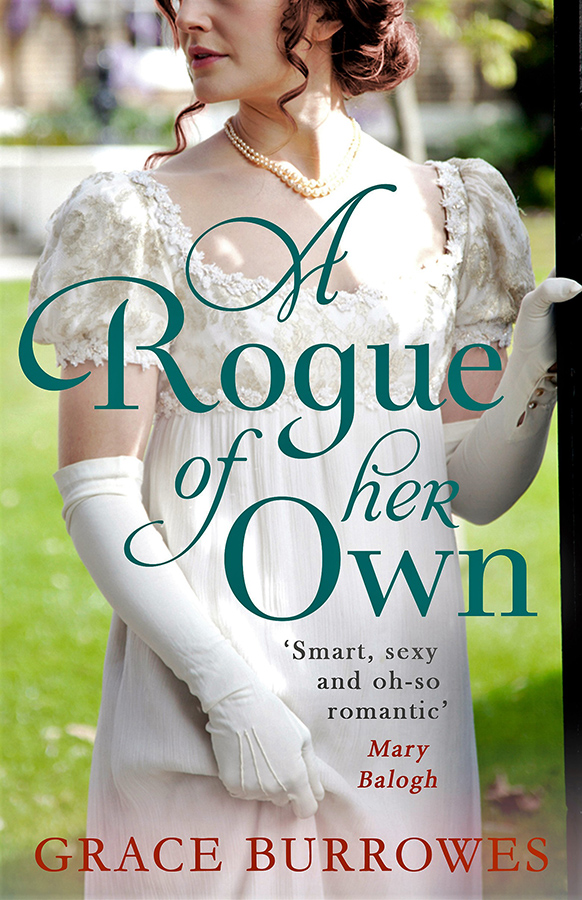
- Waterstones
- Apple Books UK
- Kobo UK
- Amazon UK
- Amazon Kindle UK
United Kingdom:

- Bookshop
- Apple Books
- Libro.fm
- Audible
- Amazon Audio
- AudiobooksNow
- Books-A-Million
- BingeBooks
- Chirp
- Hoopla
- Kobo
- Nook Audiobooks
Audio:
For those who patronize public libraries, this title has also been uploaded to Overdrive, Hoopla, Baker & Taylor, and many other library channels. You can see the full list of library distributors here.
Listen to a Snippet:
Connected Books
A Rogue of Her Own is Book 4 in the Windham Brides series. The full series reading order is as follows:
- Book 1: The Trouble with Dukes
- Book 2: Too Scot to Handle
- Book 3: No Other Duke Will Do
- Book 4: A Rogue of Her Own







